A Turnout Crowd for Turnout Gear
Fire Volunteers Press Town Board for Budget Change
by Robert Lynch, October 31, 2022
“The volunteers ask for very little. We don’t get paid… We don’t ask for health insurance. All we ask for is for the Town to provide us with the gear and equipment to be safe and do our job.”
Dennis Hubbell, President of the Enfield Volunteer Fire Company, Oct. 26.
****
Modern-day budget hearings often induce slumber. Tompkins County annually spends over $200 Million. Yet its downtown lawmakers often find themselves sitting in an empty chamber when they place their spending plan before the public each November.

Last Wednesday night in Enfield, the Town Board held a budget hearing that clearly had a pulse. Well over a dozen volunteers of the Enfield Volunteer Fire Company (EVFC) filled visitor’s chairs or zoomed-in online to press their Town Board to increase next year’s spending for “Structural Firefighting Protective Equipment”—better known as “Turnout Gear”—so as to make that budget line the same next year as it’s been for this year and for the year before, namely $35,000 annually.
In a roundabout way, EVFC volunteers got what they wanted, but not the way they had wanted it. Instead of upping the Turnout Gear spending line by $25,000 in the budget, the Board’s majority left it at only $10,000 and snared the balance, $25,000, from federally-awarded American Rescue Plan (ARPA) funds.
Because they did, Supervisor Stephanie Redmond’s Tentative Budget, which had been elevated to Preliminary Budget status with only minor changes October 12, remained intact. The Town Board beat back proposed changes both to the firefighters’ account and to the Highway Superintendent’s salary line. Highway staff will get 12 per cent pay raises. The combined Town and Fire Protection levy will rise by nearly eight-point-five per cent.
“Not perfect, but aye,” Councilperson Robert Lynch (this writer) said as he cast his vote to make budget approval unanimous. Lynch was not the only one Wednesday left less than satisfied.
“It’s not going to kill anybody to really pay a little bit extra to make sure all the firefighters are protected so they can possibly save their lives and their families’ lives, Dennis Hubbell, President of the EVFC, told Enfield Board members that night in lobbying for a budgeted increase.
“The least that can be done for them is to provide them with gear that will hopefully prevent them from getting a horrible disease down the line or getting injured or burned,” said volunteer Monique Morris, whose husband and son also volunteer for the EVFC. Morris described volunteer dedication as “incredible.”
Wednesday’s Enfield Budget Hearing lasted nearly two hours. More than a dozen people spoke, often repeatedly. The Turnout Gear increase dominated the discussion. Only Town Supervisor Stephanie Redmond and Councilperson Jude Lemke offered any significant pushback. A motion by Lynch to increase the budget by the funds the Fire Company had requested failed with only his vote in its favor.
“I think that the $25,000 is money well spent to keep our people safe,” Lynch said after the hearing had ended and his motion found itself headed toward defeat.
And addressing the Board’s preferred alternative of tapping ARPA moneys for the turnout gear’s purchase, Lynch asked the Board, “And what are we denying them by doing that? We’re denying them other moneys that they need for other purposes, are we not?”
After defeating Lynch’s motion to add the $25,000 in equipment purchases to the budget, the Board then unanimously pledged to tap the ARPA money for the gear. A formal, follow-up resolution in November will likely affirm the Board’s intent.
EVFC leaders suggested Wednesday that they’d have preferred the ARPA moneys had been set aside for such things as purchase of portable radios or maybe a more expensive project, construction of a volunteer bunk room.
Firefighter turnout gear no longer comes cheap. A complete set—helmet and hood to boots—costs about $5,000 per volunteer. Those fighting fires inside buildings ideally need two sets of outerwear, since the gear must be cleaned before it’s used again. A second fire could always erupt in the interim. Hubbell advised the Board that the EFVC has about 50 members. Thirteen people have newly-joined, he said, and eight of those still wear outdated gear.

The EVFC President said turnout gear protects firefighters from carcinogens that could become airborne during a blaze. During Wednesday’s discussion, Hubbell pointed to an older company member, Jim Whittaker, sitting a few chairs away, whose neck clearly bore the signs of cancer surgery.
“Did we cause that?” Hubbell asked rhetorically. “I don’t know. But he’s a cancer survivor… I just want you to look at that man!”
After its first, more focused hour, the Public Hearing’s second half grew increasingly contentious. Talk turned away from the outerwear firefighters needed and toward a $41,000 truck, a “Command Vehicle,” that the Company had wanted and bought. Purchased for quick response during an emergency, the vehicle sometimes sits in the fire chief’s driveway.
Supervisor Redmond, critical of the truck’s acquisition, referenced a “straw poll” she’d allegedly commissioned, one with neither Board authorization or with respondents’ names mentioned.
“They were very concerned that money was spent on a truck, instead of turnout gear,” Redmond claimed she’d heard from the poll’s anonymous respondents, “a truck that wasn’t needed when turnout gear was needed.”
Redmond viewed the fire company’s financial choices as a tradeoff. “Obviously, the gear is more important than the truck. It just is,” Redmond insisted.
“If anybody wants to say the Fire Company’s incompetent by (buying the truck), so be it,” Hubbell responded. “But we purchased it. We have it. It’s not going away now. So we’re not going to sell it to buy turnout gear.”
Fire Chief Greg Stevenson reminded the Board that the Town’s three-year contract requires the EVFC to provide modern equipment; “suitable and adequate fire-fighting apparatus,” as the contract puts it.
“We can’t eliminate a truck in favor of a steamer and a
couple of horses, or a hand-drawn pumper,” Stevenson reminded the Board.
A second concern, raised by Councilperson Jude Lemke, was the EVFC’s annual banquet and its $7,500 cost.
“$7,500 for a banquet. Maybe we could do that for a lot less,” Lemke opined.
“I think it’s important to have these kinds of discussions to be able to understand both perspectives,” Redmond responded, a continued nod to contrary viewpoints. But then she inserted an ill-timed barb: “It’s a sign of intelligence, really, to be able to see other perspectives other than your own.”
Redmond’s comment struck a nerve and caused volunteer Robyn Wishna, to bristle.
“I think it’s really disrespectful and rude and offensive to suggest that there was a lack of education—”
“I didn’t mean it like that,” Redmond interrupted. The Supervisor apologized. The hearing went on.
But President Hubbell, a 47-year EVFC veteran, observed that convincing elected leaders of his fire company’s worth is nothing new. It tends to recur with each election cycle.
“Every single time we change a Town Board, every single time, we have to go through this whole thing, all over again; re-educate everybody about the fire service,” Hubbell said. “So I’m going through this process once again. And in four years I can guarantee probably none of you will be here again, and I’ll go through it again… and again… and again until I die.”
Inserting dedicated spending for protective equipment into the budget was Beth McGee’s idea. The former Town Supervisor placed that special line item in the 2021 Town Budget. The current three-year Fire Contract, negotiated for the Town largely by Supervisor Redmond and Councilperson Lynch, set aside $35,000 for the gear purchases in both 2021 and 2022, but decreased it to $10,000 for the contract’s final, third year. Had the Town Board Wednesday put the added spending into the budget, the contract would have required renegotiation.
****
Gaining far less comment, yet still significant—and maybe equally controversial—the Enfield Board, later rejected Councilperson Lynch’s attempt to scale back Highway Superintendent Barry “Buddy” Rollins’ pay raise. The Preliminary Budget had called for both Rollins and all of his subordinates to receive 12 per cent increases next year. The Board’s majority maintained that the job market’s current state requires above inflation-rate increases to avoid Highway staff resigning for more lucrative jobs and to keep Rollins’ compensation in line with superintendents in neighboring towns.

Addressing the hearing, Cortney Bailey, last year’s write-in candidate for Town Supervisor, took a different view. Bailey argued that the Highway Superintendent should settle for the $64,000 salary set for the job when he ran for it last year. She opposed the higher, budgeted rate of $71,680.
“Congress, on the national level, needs to stop giving themselves raises,” Bailey complained. “That’s not right. That’s not fair. I don’t want to see it happening in our town,” Bailey added, bringing her wider argument home.
After the Public Hearing, but before the final budget vote was called, Lynch moved to trim Rollins’ next year’s pay to first $69,000 (a 7.8% increase), and then $70,000 (a 9.375% increase). Lynch called it a compromise. Councilperson Cassandra Hinkle supported Lynch’s latter option, but no one else did. Rollins’ salary will carry the 12 per cent increase that Redmond had recommended.
The Supervisor argued that Rollins’ deserved the double-digit raise partly due to the work he performs, partly to assure that he earns at least as much as do his overtime-eligible subordinates, and partly to “recognize his senior status” in the Highway Department. Faulting Lynch’s philosophical reservations about a mid-term pay raise— Lynch’s concerns mirroring Bailey’s—Redmond also pointed to Lynch’s having backed a more than nine percent mid-term raise for Town Clerk Mary Cornell, one approved at a prior Board meeting.
Lynch said he’d supported Clerk Cornell’s increase for a different reason; to help elevate the Clerk’s compensation to a living wage, a newly-established salary of $35,000.
“The Highway Superintendent earns a Living Wage and then some,” Lynch stated. “He also has a Town-paid truck, for good reason. He has full benefits, which the Town Clerk does not have. There is a difference.”
“But he has a CDL (driver’s license) and years of experience. And I think you’re talking about hazard pay and things like that,” Redmond pushed back, the Supervisor attempting to contrast Rollins’ heavy equipment labors with the office duties of Clerk Cornell.

“And I dare say there is one member of this community who would say that is quintessential pink-collaring,” Lynch rebutted.
“Pink-collaring” is a phrase former Town Clerk Ellen Woods employed in her previous Enfield complaints involving gender equity.
Redmond conceded that the equity argument was “valid to a certain extent.” But she did not retreat from her asserting that Rollins deserved a larger percentage raise than Clerk Cornell did.
Enfield’s Final 2023 Budget, approved that night, tops $2.5 Million in total spending. The combined Town and Fire Protection District tax levy would increase by 8.49 per cent, nearly three times the State’s, highly symbolic “tax cap.” But because of double-digit rises in property assessments affecting Town taxes, the tax rate on local property would actually decrease slightly. Aside from the heftier increases given Highway staff, most Town salaries would increase by a more modest two per cent.
In other Enfield Board business October 26th:
- The Board endorsed a Resolution authored by Councilperson Lynch that urges Tompkins County continue its long-standing practice of convening Local Advisory Boards of Assessment Review to accept springtime complaints concerning assessment increases. County Assessment staffers propose eliminating the review boards after having suspended them for several previous years and then bringing them back this past spring. Town Board members pointed to planned County changes in assessment procedures as heightening the need for the local boards.
- And with one dissent, the Town Board endorsed an application by the non-profit ”Sustainable Finger Lakes” for what could be a $750,000 grant under Tompkins County’s Community Recovery Fund. The grant would retrofit mobile homes with heat pumps. Councilperson Lynch voted against the endorsement only because he knew too little about how it compared with all the other funding requests. Lynch said he didn’t want to “put the thumb on the scales” and jeopardize more worthy applicants.
###
Second Acts Hinted for County-owned Buildings thought Doomed
by Robert Lynch, October 23, 2022
The idea may hold the lifespan of a crimson tree in October. Then, again, Lee Shurtleff may have stumbled onto something.
“I don’t know that we have really looked yet at the potential of what the existing buildings might have for us over there on the corner,” Shurtleff told a County legislative committee Thursday at a meeting called not to talk about the Key Bank and Wiggins Office Buildings near the corner of Buffalo and Tioga Streets, but rather the fate of a little old frame house down on the next block.
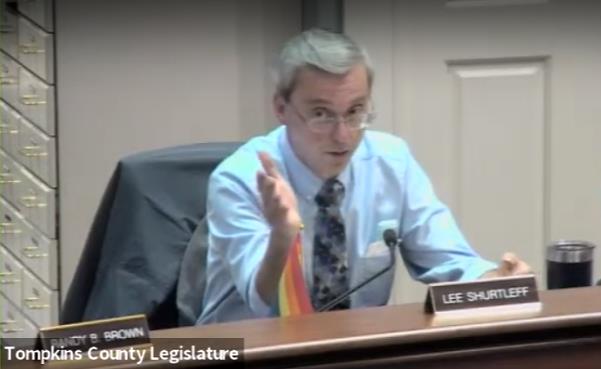
Up until now, the only future for the Key Bank and Wiggins buildings has involved their presumed close encounter with the wrecking ball. Tompkins County bought the properties last year. And once current tenants had vacated, plans have always envisioned razing both 1960’s-era buildings and planting a Center of Government—County offices—in their place. No one has talked seriously about giving those structures on the Key Bank Corner a second life, or even a short-term reprieve. Not until Shurtleff suggested it this week.
“Could the bank building be used for the County Clerk’s Office?” the Groton legislator opined. “It’s probably a bigger space than what they’ve got today—and a lot nicer.”
Shurtleff then wandered his mind’s eye next door to the Wiggins’ building.
“Could the law offices be used perhaps for the District Attorney’s Office? Well, you look at the front of the building. There’s 16 names of attorneys that are housed in the building. That tells me that there’s at least 16 offices, support staff and conference rooms that have been good enough for Wally Wiggins over the decades. Perhaps that’s a good place for the District Attorney?”
Shurtleff also said that “between the two” one might find “space for some of the offices and departments that are leasing downtown.” That, in itself, would satisfy one prime rationale for a more pricey Center of Government.

Lee Shurtleff was thinking creatively. It’s something government officials are notoriously not known for. Slash, burn, and rebuild is more their style. Go back to Ithaca’s elegant Old City Hall—you know, the one that lives today only in dusty photos at The History Center or in fading septuagenarian minds. With zero forethought, LBJ’s Urban Renewal tore down old City Hall in 1966 to make way for nothing more elegant than a parking ramp. Tompkins County’s Old Library was once eyed for government offices. Nope, the County sold it for a song, and down it came too.
When, late last year, after nearly 24 months of secret negotiations, Tompkins County closed on the Key Bank and Wiggins purchases, the only question became how soon those newly-bought buildings would become rubble, never whether they might remain standing.
The corner-lot purchases were Jason Molino’s baby. The former County Administrator was known not to like the County’s first-chosen Center of Government site, the so-called “Baker Dental Building” and its adjoining acreage that the dentists had arrogantly stripped bare of the homes that once stood there.
Molino wanted something better than what we’d bought. He found it with the Key Bank and Wiggins properties nearer to the Courthouse. Tompkins County had shelled out $1.8 Million for the Baker lot in 2019. With closing costs, buildings on the Key Bank Corner cost taxpayers another $3 Million. Molino left before the public ever learned of the latter purchase.
“Between the two areas we’ve got $5 Million invested here, and still probably a long ways away from a long term plan,” Shurtleff told the County Legislature’s Facilities and Infrastructure Committee Thursday.
Molino’s successor, Lisa Holmes, admitted to the committee that constructive reuse of the bank and Wiggins buildings had never been studied. Shurtleff’s idea may have caught her by surprise.
“We have not thoroughly looked into the square footage available in those spaces and the cost of renovating those, if necessary, as an interim step,” Holmes told the committee.

It was with good reason that Shurtleff had suggested the County Clerk and District Attorney as prospective tenants of the buildings always thought doomed. Even though County Government owns and maintains the Courthouse, the State Office of Court Administration gets to pull rank and is telling both the Clerk and D.A. to vacate. Up until now, a new Center of Government had been seen as those offices’ next home. But with construction costs rising, and lawmakers facing an uncertain economy, no one dares set a timetable for that new, larger building’s groundbreaking. If only as a temporary stopover, the bank and Wiggins’ offices might become an expedient solution to an all-too-likely eviction.
Committee Chair Mike Lane described as an “interesting thought” Shurtleff’s suggestion for relocating the County Clerk to the bank building. “Perhaps that’s something that we need to discuss,” he said.
And as a clear step back from Jason Molino’s one-time, gung-ho, build-it-now enthusiasm, Lane, like many who currently populate the Legislature, stood reluctant to take that big gulp and move ahead with the Center of Government right now.
“I’m not seeing us building a Center of Government next year,” Lane said. “I’m still worried, as so many of us are, about what the economy’s going to do. That’s a big project. That’s a lot of money; over $20 Million.”
Actually Lane low-balled the price. With land acquisition and design work, next year’s Capital Plan pegs the Center of Government’s total cost at $30.6 Million.

“It’s always nice to have new offices if you can,” Lane conceded. “But you know, we get along with what we have for now, and it can go on a little longer.”
Though Lane showed initial interest in his Groton colleague’s idea, it sparked little discussion from the five other legislators who, together with Shurtleff and Lane, attended Thursday’s meeting. “As far as what Lee’s talking about… I’m not ready to talk about that,” Newfield’s Randy Brown said bluntly.
****
The Key Bank and Wiggins buildings were never intended to be talked about by the committee Thursday. Instead, the “Red House” was. And the take-away from the committee’s 45-minute discussion that morning was that County government should hold onto the two-story Victorian structure for now, mothball it for winter, and decide later whether to put it on the market, use it in some way, or ever-more-likely, simply tear it down.

To Shurtleff, the Red House’s future fits carefully into his “broader” view, one he stressed to the committee. Utilizing what already sits on the Key Bank Corner makes it more likely that a Center of Government will someday sit on the Baker site. And if the “Red House” portion of the Baker lot were to be split off and sold, there might be too little land left to build an office building on whatever remained.
“So it’s really not about the house. It’s about the land that it sits on,” Shurtleff said. “And that’s my concern. I don’t want to see us make a quick move that removes that broader property from being an option for us to look at in the years ahead.”
The “Red House,” a residence-turned-offices at 408 North Tioga Street, has largely stood vacant since the County acquired it as part of the larger lot in 2019. Like any empty building, it’s fallen victim to elements and animals. Renovation estimates have led legislators’ jaws to drop. But facing reality, and failing to reach any consensus on a path forward, the committee agreed Thursday to do whatever little needs to be done to preserve the house until spring.
“You’re going to have to mothball the house through the winter no matter what you do,” Brown said.
Beyond winter though, the “Red House’s” lifespan looks increasingly brief. A few months ago, the building’s sale appeared to be legislators’ preference. Now, however, they lean increasing toward demolition—that is, if preservationist interests will let them get away with it. The house does stand within the DeWitt Park Historic District.
“I’d like to see the (cost) numbers for deconstruction,” Legislature Chair Shawna Black told the committee. “If we go through with plans to build a Center of Government, we’re going to need parking…. If we were to deconstruct the building, we could actually start with a clean slate and figure out where we want to go from there.”
Mind you, when Administrator Molino presented the Legislature three years ago as many as ten alternate design options for county offices on the Baker site, most had included, in one form or another, incorporating the “Red House” into the office design. True, since that time, legislators have sold off the rear, Sears Street portion of the larger lot for housing. But offloading one or more Sears Street lots had also been contemplated in some of Molino’s scenarios.
Dryden legislator Greg Mezey would rather architects forget those earlier, Molino suggestions that would have attached an aging, wooden house to a more modern brick building.
“I think based on what we’ve seen for rehabilitation cost, I don’t see how we can justify spending that much money of taxpayer dollars for such a small space to be renovated and preserved and salvaged. It seems cost prohibitive,” Mezey said.
Ulysses-Enfield legislator Anne Koreman is among those whose mind is changing; moving away from sale and toward either expensive renovation or, as she called it, “careful deconstruction.”
“The worst thing that we can do is to hold onto it and not take care of it,” Koreman, a building inspector, warned.

But expect a fight—maybe an intermunicipal one—should Tompkins County take sledgehammer in hand, pre-empt the City of Ithaca’s Historic Designation, and dismember piece by piece the one-time home at 408 North Tioga.
“The idea of tearing down the Red House—I can understand that has some attraction for making the land more flexible for our own uses. But I also think we would get tremendous pushback from the historic preservation element in the city,” legislator Rich John warned. His district includes the Red House.
“If we just tried to tear it down, we would suffer a lot of criticism,” John predicted. “We should be prepared for that.”
“We really shouldn’t underestimate the viewpoint that we’ll be seeing and hearing from the City-side in tearing town an historic building,” John later cautioned.
Some, however, saw demolition as a risk worth taking.
“I think we have to weigh the benefit to the much broader community,” legislator Mezey told the committee, “and the impact on the amount of tax dollars (renovation) will take.”
To placate critics, County officials may schedule a Red House walk-through with representatives of Historic Ithaca. They may invite City officials along too.
Procedural obstacles also complicate demolition. State-mandated environmental assessments performed to date have always assumed the Red House would remain standing. County Commissioner of Planning Katie Borgella cautioned the committee that demolition would require yet another environmental review. “It’s going to be a tricky one,” Borgella said of any report that seeks to remove a slice of history.
Rich John, may be among the few who still favor putting the Red House onto the market. “Somebody could with a lot of love and care make this into a grand house,” John predicted.
Not all agreed.
“I think we’re a little naïve to think that it’s going to be turned into some grand historic preservation project,” Mezey remarked. “I don’t see enough of that happening in the community.”
“I don’t see that house being purchased by a wealthy landowner who’s going to move his family in there,” Mike Lane added. “I don’t think that’s going to happen. Those kind of homes seem to be out in Lansing or up on the hills in some of the other parts of the county… or on the lake.”
“We have to think about the county as a whole,” Lane continued, perhaps tipping his hat, albeit reluctantly, to those who favor the wrecking claw. “And we have to think about what we’re doing long-term, at least 50 years down the road, not just for what’s tomorrow.”
Insightful; but also atypical. Elected officials seldom think that way. Perhaps if they did, Ithaca’s classic Old City Hall might still be on Tioga Street at East Seneca and not just in The History Center’s archives.
###
Sigler Stands Alone: Local Sales Tax to Stay on Heating Fuel
by Robert Lynch; October 20, 2022
“I don’t know if it will pass or not,” Lansing’s Mike Sigler said Tuesday as he placed onto the floor of the Tompkins County Legislature his appeal to eliminate the local four per cent sales tax on home heating fuel. “Let’s find out.”
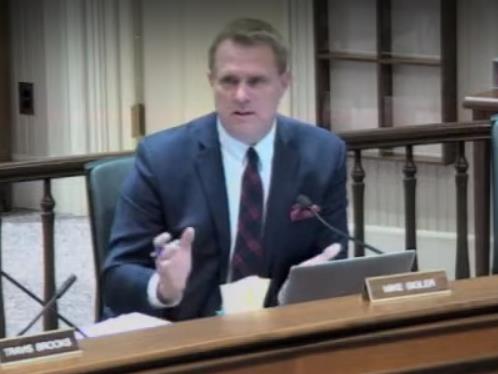
Sigler did find out. And his idea didn’t fly.
In what all too closely resembled the response given a certain (unnamed) Enfield Town Councilperson at times, Sigler’s individually-filed resolution to end local sales taxes on heating fuel, natural gas, wood products—and now also propane and electricity–lost, one vote to 12. (The resigning legislator Henry Granison had already left the room). Only Sigler voted in favor of his own resolution.
“It’s not a question of people struggling,” Sigler said, pushing back on one colleague’s criticism that a fuel tax exemption should be means-tested. “The fundamental question is do we tax things that people need to live, and I don’t think that we should.”
Sigler claimed that most neighboring counties already waive the local sales tax on heating fuel. New York State also declines to impose its portion of the sales tax.
But any local waiver would cost Tompkins County’s treasury a bundle. Legislators were told that even without including Sigler’s late-added tax waivers on propane and home electricity, the tax’s elimination would cut County tax revenues by at least $2.4 Million. And that, critics argued, would redirect financial burden to property owners.
“I think this is a little half-baked,” Dryden legislator Greg Mezey said of Sigler’s proposal. Mezey said he’d prefer a wordier resolution, one based on “more substance and with more of an actual plan.”
“I know your heart’s in the right place,” Dryden’s other legislator, Mike Lane, told Sigler. “None of us like to tax people. But I think it doesn’t make sense to move forward with your suggestion.”
Lane pointed out that a disproportionate share of Tompkins County property is tax-exempt. And that, he said, places a heavy burden upon the remaining owners who pay the property tax. Lane estimated the property levy could have risen this year by as much as 4.5 per cent had the heating fuel sales tax gone off.
“Yes, it would be loaded onto the property tax, which, yes, is kind of a means test,” Sigler conceded. “The bigger the house you own, if you live on the lake, your taxes are probably going to go up a little bit. If you live in Cayuga Heights, your property tax is going to go up a little bit. But you’re going to save it on your heating tax,” the Lansing Republican reasoned.
“I think we have a population that feels that it’s entitled to services without paying for them,” Lansing’s Deborah Dawson, the Legislature’s most hard-nosed budget hawk, chimed in.
And to Sigler’s claim that heating fuel deserves a carve-out based on need, Dawson had an answer. The property levy also taxes necessity.
“Let’s face it, everybody needs a place to live,” said Dawson. “This (your home) is a need, why are we taxing it? she asked.”
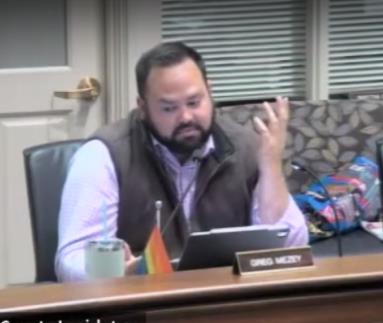
“I wish we would express the fact that this burdensome economy is as burdensome to us as a provider of services as it is to our taxpayers,” Dawson complained, “and we can’t keep giving them a break at our expense.”
Sigler told legislators that his proposal to eliminate the sales tax on heating fuel has earned him more positive response than “pretty much anything I’ve brought forward in the last year.”
Nonetheless, county lawmakers did not join the throng. Enfield-Newfield’s Randy Brown seconded Sigler’s motion, maybe just to get it onto the floor. Yet when the clerk called the roll, Brown voted no. So did Enfield’s other County legislator, Anne Koreman.
At a Budget Committee meeting October 11th, where he’d first offered his idea, Sigler had proposed the sales tax suspension sunset at the end of the heating season, on May first. But on the Legislature’s floor, Sigler dropped the sunset provision.
In addition to the property tax implications, legislative critics Tuesday cited a second obstacle. Albany’s micromanagement requires State legislation to make it legal. With the State Legislature in recess, any waiver wouldn’t have begun until winter had almost ended.
Sigler signaled he may offer his measure again—perhaps as often as once every three months.
****
Though the emotional sadness surrounding member Henry Granison’s surprise resignation clouded much of Tuesday’s meeting, the Legislature did take time to address other business. And in clearing what’s often a routine procedural gate in the County’s elongated budgeting process, Budget Committee Chair Deborah Dawson found herself standing alone as a contrarian. Arguing that lawmaker spending and tax-cutting fervor had gone farther than it should have, Dawson voted against tacking a slew of amendments onto the County Administration’s 2023 Budget proposal before sending it on to a November 7th Public Hearing. The measure passed, but without her vote.
“I can’t support this budget,” Dawson said. “It is in my opinion fiscally irresponsible and unsustainable to build a budget that creates an operating deficit with the intention of funding it with six-and-one-half million dollars of one-time money.” With that comment Dawson, no doubt, pointed to proceeds from the federal American Rescue Plan.
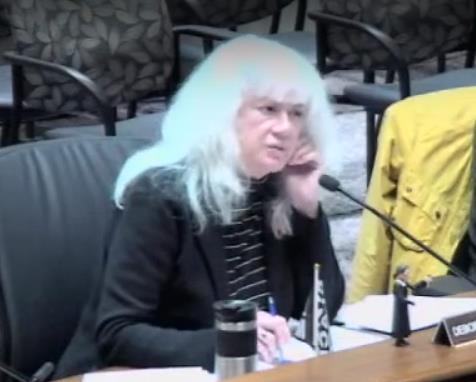
Dawson, a frequent financial pessimist, sees storm clouds building. She forecast the worst: “12-18 months of a severe global recession,” the result of what she termed the Federal Reserve’s “ill-advised monetary policy.”
And no doubt, Dawson’s dissent also targeted the Expanded Budget Committee’s final action—taken in her absence—to reduce the property tax levy’s increase to zero by drawing nearly a half-million dollars from Tompkins County’s bulging fund balance. Raiding that fund was the idea of Danby’s Dan Klein.
“I don’t think this dooms us to anything” Klein said in answer to Dawson’s fears. “If the worst case scenario does come to pass, we can correct it next year. If it doesn’t come to pass, then we did a really good thing.”
Addressing both Dawson’s recession-prone worries and Klein’s suggested remedy, Ithaca’s Rich John remarked, “I hope we have the fortitude to take these actions when we have to, if we have to.”
One financial exigency that demanded immediate attention from lawmakers Tuesday was the $6.5 Million Community Recovery Fund, County Government’s way of parceling out federal American Rescue Plan appropriations to needy applicants. Quite simply, applicant demand has wildly exceeded expectations, and the out-of-town consultant needs a fatter commission to process all of the filings.
Legislators earlier this year had set aside just $72,000 for the MRB Group to accept, screen and prioritize what some then thought would be just 30 inquiries. Instead, as of meeting night, as many as 100 applications had already been filed; 150 inquiries received. Filings will continue until month’s end. And MRB’s contract calls for per-inquiry compensation.
“This is because of us,” legislator Dan Klein admitted. “We originally contracted for a very low number. We just didn’t know.”
The resolution originally vetted in committee would have assigned an extra $112,500 toward MRB’s commission. But before Tuesday’s vote, from the floor, Klein pumped the figure up to $196,000, meaning that MRB will get more than a quarter million dollars to do its task.
Only legislator Sigler opposed the extra MRB money.
###
Legislator Granison Resigns; Illness Cited
Posted October 18, 2022
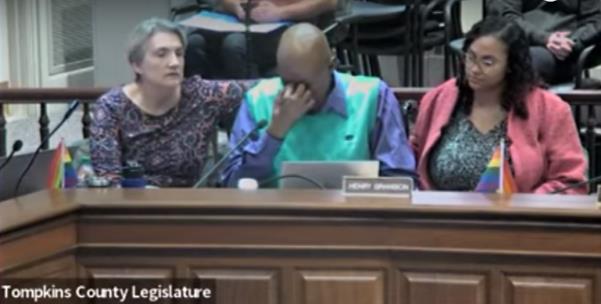
In an announcement that startled and saddened his colleagues—and quickly draped a cloak of solemnity over much of the meeting—second-term Tompkins County Legislator Henry Granison announced Tuesday his plans to resign the County Legislature at month’s end.
It came as the County Legislature had barely gotten down to business in its twice-monthly meeting.
“As some of you know, said Granison, one of the Legislature’s two African-American members, “I’m going through intensive treatment for cancer, and my treatment requires my full attention.”
It was undoubtedly the most poignant moment in the Tompkins County Legislature’s recent history. An exceedingly frail Granison, his voice wavering, the legislator at times barely able to vocalize his words, sat in a wheelchair at his legislative desk, flanked by people identified as his family. The resignation message lasted less than two and a half minutes. When finished, Granison asked to be excused to, in his words, “just to go home to my family and my constituents.”
After the departing legislator spoke, his colleagues stood and gave Granison a round of applause. Legislature Chair Shawna Black bowed her head. Shortly thereafter, Black called a five-minute recess allowing legislators to compose themselves before addressing other matters.
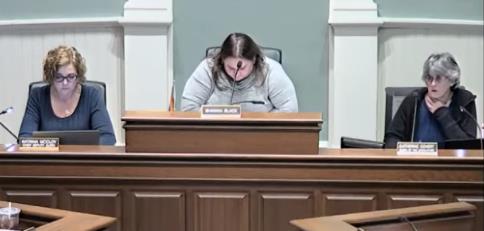
Granison, a County legislator since early-2018, represents District 3 on Ithaca’s East and South Hills.
“The constituents in District 3 are smart and thoughtful,” Granison told legislators in his departing message. “I’ve learned—I love learning from them and serving them.”
Granison had more praise to hand out.
“While my cancer treatment prevents me from completing my term, I ‘m grateful that all the good work… will continue both because of my colleagues and my constituents. That’s really all I have to say.”
“Henry, we just want to thank you for your dedication, to the County and your constituents” Black said after Granison concluded his remarks and before he left for home. “It’s been an absolute pleasure serving with you, and I think each of us—we could probably go around the circle. Every one of us has a ‘Henry story’ we could share.”
“But,” Black added, “we want you to know that we’re thinking of you. Our prayers go with you and your family, and we wish you certainly the best there is. So thank you.”
After their brief recess, most members of the County Legislature took a pass on whatever they’d earlier intended to talk about. Enfield-Ulysses’ Anne Koreman stood as the exception, perhaps reflecting a special bond she may have held with her resigning Ithaca colleague. Granison joined the Legislature the same year as Koreman did.
“I just want to say to Henry and his family that really it’s been a true pleasure working with him,” Koreman said. “He’s put a lot of time and effort into really reaching out to his constituents better than most any legislator that I’ve known.”
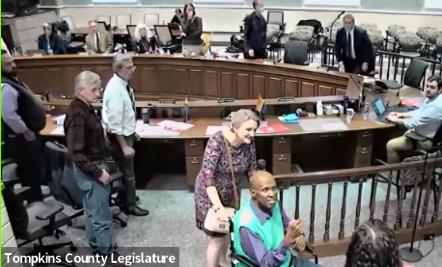
“I’m glad he’s going to able to spend some more time with his family right now,” Koreman concluded, the lawmaker at times appearing to choke back the tears. “I wish him the best on his treatment.”
“We’re going to miss Henry Granison,” Shawna Black said, hers the final word before the Legislature moved ahead with its agenda. “I know everyone’s feeling that tonight.”
Once Henry Granison’s resignation takes effect October 31st, a special election in his Ithaca City district will be held to choose a replacement. The vote will come sometime during the winter.
Briefly, in other business Tuesday:
- Lansing Legislator Mike Sigler cast the only vote in favor in his resolution that would have ended the imposition of local sales tax on heating fuel. Because only he did, the measure lost. Republican Sigler had argued fairness demanded the tax’s ending. He said fuel is a necessity, just like food.
- With one dissent, that of Budget Committee Chair Deborah Dawson, the Legislature approved and sent forward to an early-November Public Hearing, the County’s Tentative 2023 Budget and multi-year Capital Program.
- And without discussion, the Legislature approved deploying private security guards, rather than Sheriff’s Deputies, to speed up deployment of improved security measures at the County’s Human Services Building on West State Street. Sheriffs’ contract negotiations have held up the use of deputies as guards.
###
Zero-Increase Levy now in Tompkins ’23 Budget
by Robert Lynch, October 13, 2022; expanded reporting October 14, 2022
Former Enfield legislator Jim Dennis did it years ago. Now Danby’s Dan Klein has taken over the task.

At the end of a six-week string of multiple meetings adjusting—and mostly adding to—Tompkins County’s proposed 2023 Budget, Klein offered the final amendment at a meeting attended by most County legislators Thursday night. As he has done so often at a similar moment, the tax-conscious rural Klein this time requested that $490,000 be drawn out of the County’s bulging fund balance and repurposed to reduce the new budget’s tax levy increase to zero per cent. It passed.
“The County is in excellent financial shape,” Klein said, defending his vote before he cast it. “This would give a little bit back to the property taxpayer.”
Yes, it would. But perhaps in the overall scheme of things, it almost becomes for County Government a rounding error. Without Klein’s amendment to the base number on which your County Tax Bill is calculated, the tax levy would have risen by nine tenths of one per cent. As amended—and now likely to stay that way—the levy would rise not at all.
Nonetheless, whether or not the budget had been amended that night, Tompkins County’s component of the property tax bill you pay in January is likely to climb higher. The culprit is the rapid rise in property assessments. On average, in just this past year, the median-priced home in Tompkins County has climbed in value from $205,000 to $225,000. That means a cut in the tax rate, or the tax levy, can give one a false illusion of savings.
As it had stood before Klein’s amendment passed the County Legislature’s Expanded Budget Committee Thursday, the County portion of the average homeowner’s tax bill would have totaled $1,282. After his amendment passed, it fell to $1,271. The Danby lawmaker just saved his average constituent a mere eleven bucks. Still, because of those pesky new assessments, the 2023 tax bill would still come in $113 higher than it did last winter.
Thursday’s session of the Expanded Budget Committee—in effect, it’s the entire County Legislature meeting as a committee-of-the-whole—completed lawmakers’ overly-long, and some would say unnecessarily complex annual sojourn through departmental PowerPoint presentations and last-minute add-ons; agency gifting that sometimes resembles the legislative equivalent of stuffing a Christmas turkey.
Among the last-minute budget revisions Thursday was one that particularly welcomed Enfield’s leadership. The request breezed through the committee and afterward earned itself a round of applause. Legislators endorsed a so-called “Over Target Request” to establish within their Department of Emergency Response a new position of EMS Coordinator. The Enfield Town Board had the night before specifically adopted a Resolution that urged the position’s inclusion.
The EMS Coordinator, with first-year salary and benefits of over $110,000, would lay the groundwork for establishing Tompkins County’s first rapid-response emergency medical service. Under the program’s model, the County would staff and equip a specially-equipped SUV, a “flycar,” to respond to medical emergencies whenever a private or municipal ambulance might otherwise prove unavailable.
But back to the overall budget itself. If history charts the future, the Budget Committee’s final actions Thursday ended all of the Legislature’s heavy lifting. The next stop, a Public Hearing November 7th, will be lucky to elicit a comment or two. The County Legislature’s final budget adoption would come later next month.
In Thursday’s climactic, albeit predictable, move, Klein’s zero-increase amendment to the tax levy passed by an 8-3 vote. Another three of the Legislature’s 14 members were excused. The margin of passage stands large enough to assure final legislative approval, providing no one changes his or her mind.
“This isn’t our money. This is the people’s money,” Enfield-Newfield legislator Randy Brown said in supporting Klein’s initiative. “If you look at the last ten years, I think the County always increases fund balance. It’s not our money. That’s why I support Dan.”
Brown said he was surprised the Legislature wasn’t decreasing the levy even more.
Enfield’s other legislator, Anne Koreman, also backed the levy-trimming plan, though more cautiously.
“I do hear a lot of concerns about inflation, and those are real concerns to me,” Koreman said. “$490,000 (the fund balance’s reduction), that’s something I feel comfortable with, trying to keep our taxes down, even if just a little bit.”
Other voices joined in.
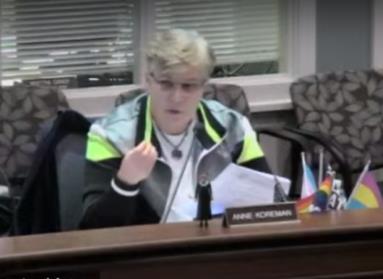
“I’m fully on board with supporting this,” freshman legislator Greg Mezey said in support of Klein’s zero-increase amendment. “We’ve over-collected and I think it’s time to send a little bit back.”
Mezey added, “And I don’t think that there’s a better time or more of a time of need than our current economic condition that we’re in.”
“Without a true reduction in the tax rate,” said Groton’s Lee Shurtleff, who chaired the Budget Committee Thursday in Chair Deborah Dawson’s absence, “these increases in the assessments translate into pretty much an automatic tax increase.”
But expect Dawson, when she returns, to join the three legislators who opposed Dan Klein’s drop to zero. Dawson, a fiscally pessimistic budget hawk, opposed last year’s similar levy reduction. And during a committee meeting earlier in the week, the Lansing Democrat commented on Klein’s intended action, “OK, so let’s run down that fund balance so we don’t have the cushion.”
Legislature Chair Shawna Black was among those who opposed drawing down the fund balance during Thursday’s voting, as was Dryden’s Mike Lane and Ithaca’s Amanda Champion.
“The problem I’m having right now,” Black told legislators, “is the fact that the stock market continues to be extremely volatile, the interest rate is all over the place, and I do think that we’re in for some hard times. So this is the one year I’m not going to support it.”
“We have increases for electricity, for fuel, for asphalt, for police cars, for pencils,” said Lane, who fights year after year to protect the County’s fund balance from a tax-cutting raid like Klein’s. Lane admitted his Republican opponent in last year’s close race attacked him on the very point he now defends.
“Sorry, but I think it’s honest with my taxpayers in my district to say that our costs are up,” Lane said Thursday. So as to the fund balance, he continued, “I think we ought to leave it where it is.”
The revised tentative Tompkins County 2023 Budget, now sent to the November hearing, tops $200 Million. Financial administrators credit higher-than-predicted sales tax revenues and casino income for easing the burden on property taxpayers, even apart from the increased assessments that keep rates down.
****
The 11-0 vote Thursday in support of the new position of EMS Coordinator, a top priority not only for the Enfield Town Board, but for most rural emergency agencies countywide, came with it only praise, including commendation for members of the Enfield Board that had passed a Resolution supporting its creation the night before.
“This is one of the most important things that we’re going to vote on for this budget,” Legislature Chair Shawna Black said of the EMS position. Whether residents live in Ithaca or in the lesser-served rural expanses, “they’re all of our constituents,” Black said. And answering medical calls promptly “is definitely the difference between life and death—minutes.”
“I think this is a much-needed service for the community,” Director of Emergency Response Michael Stitley told the committee. “It’s a really great way of supplying the community-based services to help support particularly the volunteer agencies that sometimes struggle, especially during the day, to respond to some of these calls.”

Stitley told the committee that the EMS Coordinator, once hired, would spend much of 2023 planning the rapid response service. But he or she might also staff the vehicle once the flycar becomes operational, perhaps in 2024.
Meanwhile, on an unrelated matter, Budget Committee members spent an unexpectedly long time Thursday—some 35 minutes—on a much less costly, though one could argue far more controversial budget add-on.
At the recommendation of Enfield-Ulysses legislator Koreman and Ithaca’s Veronica Pillar, Ithaca’s Southside Community Center requested—and secured—a last-minute $25,000 funding award to hire a Teen Coordinator to enable Southside’s Deputy Director, Kayla Matos, to relinquish her program responsibilities temporarily and hunt for grant funding that would underwrite the Southside Center’s programs. Koreman called it “priming the pump.”
What made the otherwise somnolent request dicey was a point that no legislator chose—or perhaps, dared—to raise. During her hurried presentation to the committee, and her somewhat-testy exchange with Lansing’s Mike Sigler, Matos defined Southside as an organization “unapologetically serving people of color.” When Matos did, one might infer the Deputy Director had also suggested that Southside’s governmentally-subsidized community programs categorically exclude other races.
“Mam,” Sigler responded, “I would suggest that the County is unapologetically serving people of color.”
“However,” Matos rebutted, “we can be more explicit about our actions and who we are serving. And we are serving people of color in Lansing; we are serving people of color in Dryden, in Freeville; in the County. Actually, we are serving people of color in those places more than we are serving people of color in the City due to gentrification.”
Legislators Koreman and Pillar, in their own defense of the agency’s request, also stressed the Southside Center’s racial focus. If there was an implied bias, no one explored it. Southside got its $25 Grand.
###
Highway Wins; Fire Company Loses; Enfield Prelim Budget Set
Clarification (Oct. 14): Contrary to what members of the Enfield Town Board were led to believe during their October 12th meeting, adoption of the Town’s Preliminary Budget that night does not preclude them from reducing—but not increasing—an elected official’s salary subsequent to the Preliminary Budget’s adoption and posting.
Enfield Supervisor Stephanie Redmond clarified state law to Town Board members the day after their meeting. Though neither Supervisor Redmond nor this writer is an attorney, Section 27 of New York’s Town Law makes the distinction clear that only elected officers’ salaries “in excess of the amounts respectively specified in the notice of (budget) hearing” are impacted by the statutory prohibition, absent the Board’s subsequent adoption of a local law carving out an exception.
Therefore, the level of Highway Superintendent’s pay—or that for any other elected officer—specified in the adopted Enfield Preliminary Budget could be reduced, though not increased, by the Town Board after the October 26 Public Hearing. Nothing in state law prohibits the Board from adjusting, either upward or downward, rates of pay for non-elected Town employees after the Preliminary Budget’s adoption. / RL
****
by Robert Lynch, October 12, 2022
Enfield Highway Superintendent Barry “Buddy” Rollins’ salary will rise from $64,000 to more than $71,000—a 12 per cent increase—under a 2023 Tentative Budget elevated to Preliminary status by the Enfield Town Board Wednesday night. Rollins’ four departmental subordinates, each of them paid less than the Superintendent, would also receive 12 per cent raises under the spending plan.

Though some budget lines—including perhaps non-elected employees’ wages—could be changed before the Enfield plan becomes final, the Superintendent’s raise is effectively locked in by the Town Board’s Wednesday action. State law prohibits a Town Board from changing elected officials’ compensation once a budget moves this first step up the ladder toward adoption.
Meanwhile, the Enfield Volunteer Fire Company (EVFC) failed in its effort to secure a requested $25,000 to fund additional protective clothing purchases for its firefighters.
Councilperson Robert Lynch (this writer) moved the requested EVFC additional appropriation. If approved, the money would have kept so-called “turnout gear” spending the same as for 2021 and 2022, namely at $35,000. No one seconded Lynch’s motion. His amendment died. EVFC Secretary and former Town Clerk Ellen Woods later expressed frustration at the defeat.
The Town Board’s decisions Wednesday made no change in the spending or tax figures that emerged from the Board’s earlier budget work session last Friday. As it now stands, the Preliminary 2023 Enfield Budget would total $2,512,441, with appropriations up by more than $181,000, or 7.2 per cent, from the current year’s budget. The total Town and Fire Fund moneys to be raised by taxes would increase by nearly 8.5 per cent. That’s 2.9 times the State-determined, largely symbolic “tax cap.”
Though General and Highway Fund expenditures and tax levies would rise, spending and taxation in the Fire Fund would actually go down, in each instance by just over five per cent.
Wednesday’s Board vote on the Preliminary Budget was unanimous, even though at least one member had misgivings. Councilperson Lynch coupled his affirmative vote with his stated regret that the fire clothing line had not been kept at earlier levels.
Lynch also voiced reservations about the size of the raises given the Highway staff and the Superintendent. Yet he acknowledged that all others on the five-person Board had already that night voiced support for the 12 per cent increases. He saw little need to wage a futile fight against the majority.
“We have to bring them up to where other municipalities are,” Supervisor Stephanie Redmond said as she argued for hiking Highway pay by double-digits, even though others on the Enfield payroll—including Town Board members and Redmond, herself—would receive raises of as little as two per cent.
Redmond cited concerns about employee retention among existing Highway Department staff. She also noted that one position on the department’s roster remains vacant, and Rollins has been unable to fill it.
Board members have so far done little tinkering with the spending document that Supervisor Redmond unveiled as her Tentative Budget on September 28th. The principal change Board members made—relatively minor in the overall scheme of things—was their decision at a working meeting last Friday to raise Mary Cornell’s combined Town Clerk’s and Tax Collector’s salary from $32,000 to $35,000, a just over nine per cent increase. The adjustment holds minimal impact overall.

Town Board members also last Friday, at Councilperson Lynch’s request, directed 10,000 more dollars into the catch-all Contingent Fund. Lynch sought the additional rainy-day moneys to guard against unexpected interest rate hikes in financing Enfield’s new salt barn.
“We only have three more years on the Highway Garage,” Redmond exclaimed as the budget moved toward preliminary adoption. The Supervisor took note that both salt barn financing and that for a Highway facility now nearly two decades old has hit Town debt service with a one-two punch.
The salt and sand storage facility, constructed earlier this year, stands financed at present with only Bond Anticipation Notes. Given rapidly-rising interest rates, those notes’ conversion to more permanent financing, perhaps sometime next year, could carry a cost that’s simply anyone’s guess.
After it elevated Redmond’s tentative spending plan to a Preliminary Budget Wednesday, the Town Board set October 26th, two weeks thereafter, for a Public Hearing on the spending document. After that late-month hearing, the Board could make additional, albeit more restricted, financial changes. Or it could simply adopt un-amended what sat on the table at the end of Wednesday’s meeting.
In a brief moment of unsuccessful magnanimity, Councilperson Jude Lemke, who has since her appointment to the Board declined to take a Town salary, offered to transfer $2,000 of her budgeted Councilperson’s pay so as to increase Supervisor Redmond’s salary by an equivalent amount. Lemke maintained that no one works harder in Enfield government for her pay than Redmond does.
The Supervisor might have accepted the gift, but was stopped short by Town Bookkeeper Blixy Taetzsch, who questioned the gratuitous transfer’s legality.
“The salary goes with the position, not the person,” Lynch reminded the Board. “Were Jude to resign,” he observed, “we’d need the money to pay her successor.”
Lynch, and quickly thereafter Councilperson Cassandra Hinkle, promised to donate their meager $72 (2%) Councilperson’s raise to the Town’s cemetery fund as a symbolic goodwill gesture of frugality.
Though he lost on a couple points, Councilperson Lynch thanked his fellow Board members, both at the close of Wednesday’s budget discussions and then at meeting’s end, for keeping the evening’s discussions collegial and tempers at bay.
Wednesday’s Town Board session was among the shortest of Enfield regular monthly meetings in recent memory. It ran for little more than 90 minutes, including a sparsely-attended 15-minute public hearing on an unrelated matter at the meeting’s start. The budget discussions themselves took only 20 minutes.
“We had disagreements tonight,” Lynch conceded. “But we settled them under Robert’s Rules of Order…. We did OK.”
###
Please, Put it in Writing:
Big Changes Coming (Again) as County Reval Plans Evolve
by Robert Lynch; October 11, 2022
Tompkins County Director of Assessment Jay Franklin said inspiration hit when he’d least expected it.
“Finally, one Saturday morning, I woke up, got my coffee, went out on my deck, and I finally found the benefits of remote work,” Franklin told the County Legislature’s Government Operations Committee October 6th.

True, a few among us might have wished the Director had stayed in bed.
Franklin’s caffeine-stoked inspiration—he told the committee that “lightbulbs went off” in his head—led him to turn about-face on a recommendation he’d made to that same group of lawmakers just one month earlier.
Gone now are the Assessment Department’s plans to revalue Tompkins County properties only once every three years and to couple that “triannual” reassessment with a fractional valuation plan that the Director conceded was “just misleading” and “non-transparent.”
Instead, Franklin’s revised strategy would have the department revisit everyone’s assessment each and every year. As such, it would likely increase most everyone’s valuations yearly as long as home values keep spiraling upward. Given his office’s limited staff and work space, the only way annual revaluation remains possible is through “sampling,” the Director told the committee.
In its most brutal, sledgehammer sense, “sampling” would have County staff revise your own property’s value not based on a particularized curbside inspection of your own home, but rather on what they might see at your neighbor’s property down the road.
And while assessors would attempt to distinguish his mansion from your hovel, the “trending” component inherent in the sampling methodology could still contaminate a home’s actual worth, despite everyone’s best intentions.
And there’d be a second change; a procedural one. Because of the mountains of new paperwork that universal annual reassessment would entail—and the flood of resident complaints that would likely follow—Franklin plans to rewrite the complaint procedures in a way that could frustrate many an aggrieved homeowner. No longer would the phone call or an office visit become the first opportunity for protest. Instead, an owner would first need to fill out a form and explain to assessment staff in writing why they believe their home was wrongly valued.
“Rather than allow in-person or telephonic appointments, we will only accommodate online/paper submissions,” Franklin wrote the County Legislature in a September 28th memo. “We have found that the in-person or telephonic appointments do not present us with any more information and in fact these appointments typically present less information than the appointments that are filed online/paper,” the Director wrote.
Owners will “be able to provide something to us,” Franklin told the committee in defense of the paper-first complaint process. “Right now, they’d come in, and talk to us and provide us with nothing. That’s a wasted ten-minute appointment.”
A personal visit could come later, Franklin assured the committee at its meeting. But a shuffling of paper back-and forth would need to happen first. In fact, it’s possible the owner might not meet with anyone face-to-face until Grievance Day at the end of May.
“There are people out there, many of them senior citizens, many of them whose verbal skills are not their strong suit, who can’t really write a letter,” Enfield Councilperson Robert Lynch (this writer) told the Government Operations Committee prior to Jay Franklin’s presentation. “But you know what they can do? They can come down Wednesday morning to that Assessor’s Office on Buffalo Street, look the person in the eye and say, ‘With all due respect, sir or madam, you’ve got it wrong. My property was overvalued by you, and here’s the reason why.’”
In his later remarks to the committee—and somewhat in conflict with his less compromising earlier-written statements—Franklin walked back his insistence on written-only communication.
“Our doors aren’t going to be locked. ” Franklin assured the committee. “Let’s dispel that misconception. We’re still going to be here…. The public can always call us up and say, ‘Hey, Jay, I think I’m over-valued.’”
“So we’re taking those phone calls and we’re going to review them,’ the Assessment Director told committee members. “We’re always more than willing to sit down with a property owner whenever they have questions about their assessment.”
Yet Franklin also held firm to his streamlined stipulations, “(With) that first step, we want to screen property owners and make sure that their time is valuable and useful and our time` is valuable and useful.”
In other words, homeowners, do your homework first.
As for the adoption of assessment sampling, a technique the Director said the State routinely undertakes, Franklin promised committee members his people won’t inflate everyone’s values equally.
“We’re looking at (properties) by town; by neighborhood,” Franklin said. “We’re sampling parcels through different building styles, land sizes, building condition, building grade, value ranges in order for us to try to find where the market is moving and be able to accurately adjust those values.”
Franklin added that the “better-condition houses” those that are “move-in ready” have escalated in price faster than have “lower-end, poorer condition houses.” Yet in many cases, assessments would move up and down by class under the new procedures. Nuance might escape the process.
Last year, after a several-year hiatus, Tompkins County resumed its more than half-century tradition of assembling Local Boards of Assessment Review in each of its towns, enabling local people to hear local complaints. Local Review Boards can only recommend assessment changes; they cannot demand them. Last spring, only two owners grieved at the one-day local review in Enfield. Franklin recommends that local sessions again be cast aside.
“These Boards were put in place back in 1968 when we went county-wide assessment,” Franklin explained to the committee. “This was back when people didn’t want to come down to the City of Ithaca. We put these in to allow them to go out and see a local face, and then that local face should be able to provide a recommendation to the (County) Board of Assessment Review.”
In some towns, Franklin claimed, no one this year showed up. He termed the local boards “just not worth the time, the cost, and the effort.”
What’s more, the Director said, “It’s misleading to the property owners too.”
“If they go before someone, they think that they can affect that change, but unfortunately that’s not how these work,” the Director cautioned.
Interjecting her own comment, Ulysses-Enfield legislator Anne Koreman said she’d support the Local Boards’ abolition. Koreman argued local boards draw Assessment Department staff away from other, more pressing assignments. Enfield’s other County legislator, Randy Brown, Tuesday indicated his continued support for the Local Boards.
****
If given more personnel, the shortcuts the Assessment Director envisions could be avoided. Yet Franklin showed no interest to the committee for enlarging his staff. County Assessment once had 19 people. It now claims only ten. It’s given over part of its floor of offices to Information Technology. So if the County were to hire more people—and if Franklin were able to fill the slots—he’d have little place to put them.
County Legislator Mike Lane is among those who would give the Assessment Director more people to do the job right. Yet no one else on the Government Operations Committee openly shared the Dryden legislator’s sentiment. Lane also disputed Franklin’s claim that the Local Boards are a waste.
“I would think that it would look kind of weird to the public to do away with them,” said Lane, among those legislators who pull one-day stints as local reviewers. “I don’t think it’s a waste of legislators’ time. We’re there. We’re available…. And they get to look at us, and they’ve got somebody listening to them.”
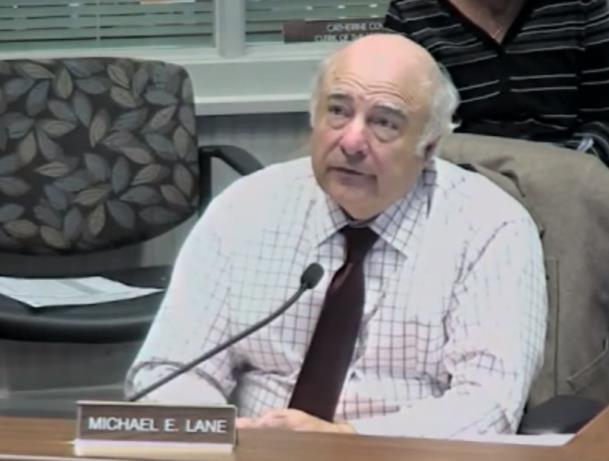
Exactly how much power the County Legislature holds to impose its will over Franklin’s department remains unclear. The Legislature could authorize increased staff. It could also mandate the local hearing boards. However, it will likely do neither. As such, the Director of Assessment’s revisions will likely become a baked-in change.
“What I’m urging you today to do is to hold off on endorsing the Director of Assessment’s recommendations,” Enfield Councilperson Lynch told the legislative committee, a delaying action it subsequently declined to take. “I think they need more study. I think the public needs to weigh in. I think Town Boards like ours need to weigh in. “
Lynch also suggested the committee seriously consider legislator Lane’s suggestion for increased departmental staffing. “Let’s give the Assessment Department all the resources it needs to conduct annualized assessments with face-to-face meetings just like it’s always been done…. I think we’ve got the money in the budget, thanks to increased assessments. We’ve got money to spend on this. And I think we should.”
###
Deidra to TC: “See You in Court.”
Fired Reimagining-critical reporter takes her complaint to the Legislature
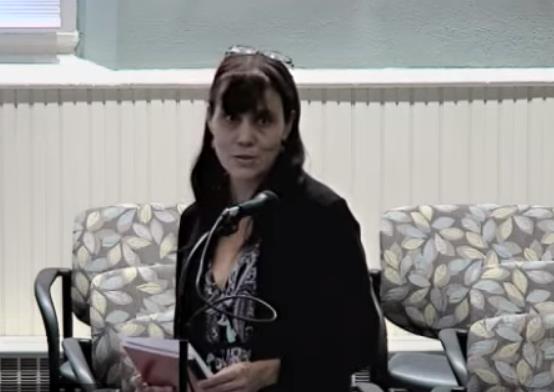
by Robert Lynch, October 6, 2022
Former Tompkins Weekly reporter Deidra Cross, out of work and angry, took her grievance against one County official’s alleged First Amendment meddling to the floor of the Tompkins County Legislature Thursday. Cross made it clear she blames County Communications Director Dominick Recckio for her firing, though she never mentioned Recckio by his full name during her time-limited Privilege-of-the-Floor comment.
Legislature Vice-Chair Deborah Dawson, presiding at Thursday’s meeting, tried to shut Cross down. Cross would have none of it. Dawson was not pleased. But neither was Cross. I wasn’t pretty.
Cross: “This is a government official (Recckio) that has impeded on my employment, my opinion, and now my termination.”
Dawson: “You know, Ms. Cross, you are skating dangerously close to violating the rules of your public forum here, so…”
Cross (interrupting): “Public statement from your own commission (sic)…”
Dawson: “But you are not allowed to use this forum to comment on the performance of a named employee. That’s clear in our rules, because that’s the condition of using public…”
Cross (again interrupting): “I didn’t name anyone. I followed your guidelines. I didn’t name anyone.”
Dawson: “Well, we can debate that. Your three minutes are up. Thank you very much.”
Cross: “It was not three minutes.” (Actually nearly four minutes’ time had elapsed.)
Dawson (after checking with the clerk): “Yes, it was.”
Cross (after a pause): “See you in court.”
Dawson: “I look forward to it.”
Cross, (exiting): “So do I, actually”
Dawson: “Good bye.”
Yes, for a brief view few moments Thursday, a spark of life and anger—mutual antipathy, to be blunt— illuminated an otherwise hum-drum County Legislature meeting, one of the briefest—and dullest—of its type in months, maybe years.
And when Deborah Dawson bid Deidra Cross her snarky farewell, Legislature Chair Shawna Black—zooming-in from home and nursing a case of COVID—was shown on the split screen briefly cracking a smile.
Quite obviously, Tompkins County lawmakers, at least the body’s liberal majority, are circling the wagons in support of their Communications Director and his intervention with a local publication in furtherance of his mission to defend Reimagining Public Safety and Tompkins County’s role in it.

Though the publication might dispute the causal connection, Deidra Cross maintains Tompkins Weekly fired her because of two articles she wrote, both of them profiles of local notables openly critical of the County/City of Ithaca collaborative to reform local policing. Most recently, Cross profiled Trumansburg Mayor Rordan Hart. Last April, she interviewed builder and conservative activist Rocco Lucente.
As she began her remarks, the fired journalist quoted Recckio’s previously-released criticism of Cross’ Lucente article. Cross read a reported email to Tompkins Weekly Editor Jessica Wickham, one that generated from the editor a transparently ingratiating—if not fawning—reply.
Recckio (as quoted by Cross to the Legislature): “Jessica, I’m sharing with you that I’m concerned about this week’s (Tompkins Weekly profile of Lucente.) This is peppered with lies, misleading statements and unfounded attacks on several topics under the guise of featuring a harmless activist and writer…. I expect there will be others upset by this piece. I just want to make you aware of these concerns.”
Wickham, in reply (again, as quoted in Cross’ comments): “Thank you for reaching out. I will say that I had similar concerns myself without going into it….”
Wickham, later in that quoted email: “My sincerest apologies if the article’s subject upsets you or anyone else. If you or anyone finds anything that is a statement of fact that is misleading or false in nature in the article, please don’t hesitate to let me know…. Also, feel free to refer anyone who is upset with the article to me. If there is considerable backlash, I will talk with my publisher about these opinions.”
****
“So,” Deidra Cross told the Legislature as she finished her quotes, “that is a government official weighing in on an article that was already vetted and published for the sixth time regarding RPS (the Reimagining effort) in the publication I’ve now been terminated from.”
Cross has threatened to sue over the County’s intervention, alleging it cost her job. Ithaca City Alderperson Jeffrey Barken, who first exposed Recckio’s efforts during his own floor comments to Ithaca’s Common Council September 7th meeting, has alleged the Communications Director infringed on Cross’ and the paper’s First Amendment freedoms.
Tompkins County Attorney William Troy, in a statement released the day following Barken’s disclosure, cleared Recckio of any impropriety. “At no time was any threat made directly or indirectly against anyone,” Troy wrote of Recckio’s actions.
Dominick Recckio, for his part, has declined public comment on the matter. And aside from the ex-reporter’s floor statement, Thursday’s County Legislature meeting dealt little with the lingering Reimagining controversy or Recckio’s involvement in it.
Shawna Black, who at the Legislature’s previous meeting had offered a full-throated defense of Recckio and of Reimagining, and who had then criticized Barken’s statements as “defamatory and uninformed accusations,” remained mum on the issue Thursday.
Reimagining’s defense, instead, came at Thursday’s meeting from one source; Ulysses-Enfield legislator Anne Koreman. Though she declined to wade directly into the Communications Director’s flap, Koreman defended police reform in concept. She also pushed back gently on Mayor Hart’s comments, those earlier quoted by Cross, that Reimagining’s alleged demoralization of Ithaca’s police has thinned IPD’s ranks and placed heavier burdens upon medical first responders, like Trumansburg’s.
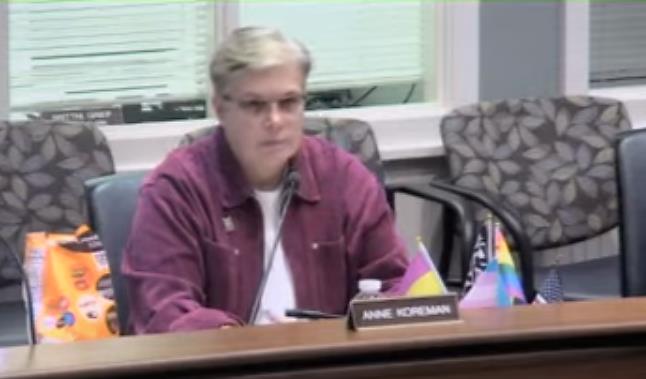
“Might we not be doing everything right the first time?” Koreman asked rhetorically. “Yes, I do agree. We’re not going to do it perfect.” Koreman continued, “Might there be unintended consequences? Yes.”
Nonetheless, Koreman added, “I do believe that we are headed in the right direction. So I think it’s very important that we continue to do that (Reimagining) as best we can.”
By the time Koreman spoke, Deidra Cross had already left the room. Had she remained, she might have had something to say—providing, of course, that Deborah Dawson would have let her say it. No love lost.
###
October News Briefs:
Costly Conference Center Grabs $$$:
(Oct. 21): Call it a small footnote to this week’s County Legislature meeting. Yet view the principle behind it.

Ithaca’s Downtown Conference Center—which I believe Tompkins County foolishly bought into—is costing more to build than the $31.5 Million projected when community leaders committed to build it just before the pandemic broke.
“The construction cost on this project, as pretty much any construction project these days, has gone well above budget, and that’s the basis for this ask,” Ithaca’s Rich John told his Tompkins County Legislature in requesting it refund $18,551 in Mortgage Recording Tax the Center’s developers mistakenly paid, but now want back to help pay for cost overruns.
The County Legislature consented, but only on a 9-4 vote.
“The Conference Center would be a community-wide public benefit,” John insisted. Some might disagree. I did, and told it to the Legislature just as the pandemic hit.
“This grandiose Conference Center initiative was acknowledged to be a risky experiment (pre-COVID),” I said in March 2020. “Rational minds must now multiply that risk many times in light of today’s reality.” Amen / RL.
###
New Enfield Streamside Rules Possible:
(Oct. 5): It could be argued that boring meetings produce the best law. If so, the Enfield Planning Board could have spent nearly two hours wisely Wednesday crafting details of new water protection regulations that could limit some future commercial and residential development close to the town’s major streams.

Using a draft Town of Caroline protection law as its launching point—but Board members frequently faulting Caroline’s as too detailed and intrusive—Enfield planners drew themselves toward proposed regulations that would restrict development within a 100-foot buffer zone of so-called “perennial streams,” generally Enfield Creek and its principal tributaries. Unlike in Caroline, “intermittent streams,” those that don’t flow all the time, wouldn’t be regulated. Residents who want to build within the buffer could still seek a Planning Board waiver.
And unlike Caroline, the Enfield regulations would largely steer clear of farming. The Caroline draft, members claimed, would prohibit agricultural operations within 50 feet of any stream.
“Can you tell somebody you can’t plow over there?” Board member Mike Carpenter asked. Board Chair Dan Walker replied that’s a State decision. “We can’t supersede DEC,” Walker maintained.
Two months ago, the Enfield Town Board handed off to its Planning Board the task of drafting tighter land use regulations. Wednesday’s working session carried the mandate forward. The streamside rules would likely become part of a revised Site Plan Review Law planners have worked on for months.
Enfield’s Water Protection Committee has requested the tighter rules. “Floods are getting bigger,” Carpenter warned. Though he also stated, “I don’t like making laws we’re not going to enforce.”

